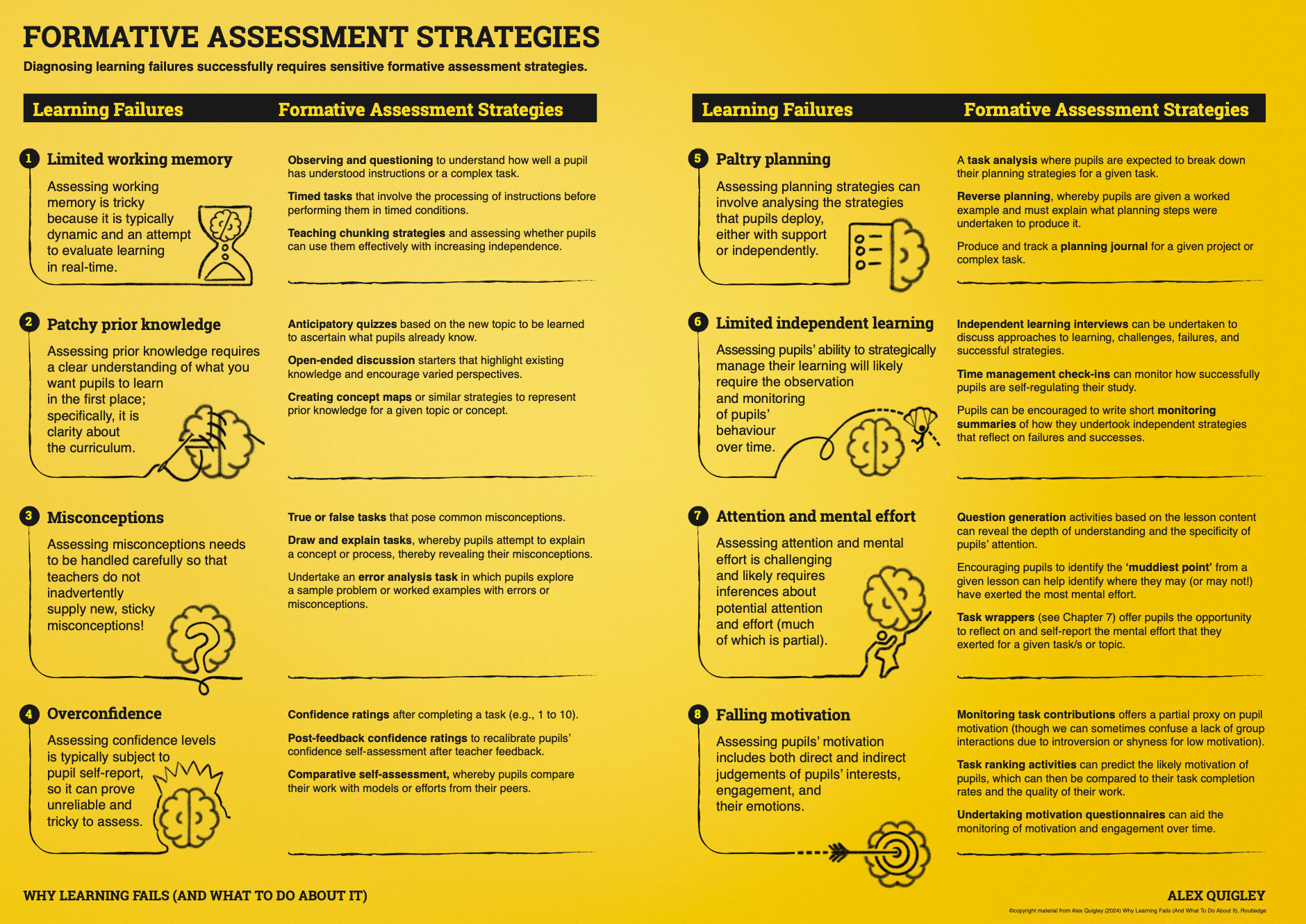Even with the best-laid curriculum plans, classroom learning can easily go awry. A painstakingly crafted lesson plan is always at the mercy of pupils’ misunderstanding.
In his brilliant book, entitled ‘The Hidden Lives of Learners’, Graham Nuthall observed and recorded around 10,000 lessons and concluded that:
“One of the greatest enemies of effective teaching is pupil misunderstanding. No matter how well you describe something, how well you illustrate and explain it, pupils invent some new way to misunderstand what you have said.”
It is a chastening truth. They may remember that their friend joked about the ‘Peasant’s revolt’ but have scant memory for the careful explanation expertly crafted by their teacher.
A solution to these learning failures is a recognition that learning is not readily visible and that it is important to continually expose pupils’ thinking – their prior knowledge, preconceptions, misconceptions, beliefs, and more. Continuous monitoring of learning is necessary if we are to effectively seek out success or failure. Formative assessment offers up the essential information about pupils’ learning in the moment so that teachers can better discern the difference.
Formative assessment strategies to solve key learning failures
Formative assessment approaches are those moment-by-moment responses to the tricky issues and barriers that beset even the best laid lesson plans. They are part of the typical repertoire of expert teachers. Just some strategies include:
Limited working memory
- Observing and questioning to understand how well a pupil has understood instructions or a complex task.
- Timed tasks that involve the processing of instructions before performing them in timed conditions.
- Teaching chunking strategies and assessing whether pupils can use them effectively with increasing independence.
Patchy prior knowledge
- Anticipatory quizzes based on the new topic to be learned to ascertain what pupils already know.
- Open-ended discussion starters that highlight existing knowledge and encourage varied perspectives.
- Creating concept maps or similar strategies to represent prior knowledge for a given topic or concept.
Pupil misconceptions
- True or false tasks that pose common misconceptions.
- Draw and explain tasks, whereby pupils attempt to explain a concept or process, thereby revealing their misconceptions.
- Undertake an error analysis task in which pupils explore a sample problem or worked examples with errors or misconceptions.
Pupil overconfidence
- Confidence ratings after completing a task (e.g., 1 to 10).
- Post-feedback confidence ratings to recalibrate pupils’ confidence self-assessment after teacher feedback.
- Comparative self-assessment, whereby pupils compare their work with models or efforts from their peers.
Paltry planning
- A task analysis where pupils are expected to break down their planning strategies for a given task.
- Reverse planning, whereby pupils are given a worked example and must explain what planning steps were undertaken to produce it.
- Produce and track a planning journal for a given project or complex task.
Limited independent learning
- Independent learning interviews can be undertaken to discuss approaches to learning, challenges, failures, and successful strategies.
- Time management check-ins can monitor how successfully pupils are self-regulating their study.
- Pupils can be encouraged to write short monitoring summaries of how they undertook independent strategies that reflect on failures and successes.
Attention and miserly mental effort
- Question generation activities based on the lesson content can reveal the depth of understanding and specificity of pupils’ attention.
- Encouraging pupils to identify the ‘muddiest point’ from a given lesson can help identify where they may (or may not!) have exerted the most mental effort.
- Task wrappers offer pupils the opportunity to reflect on and self-report the mental effort that they exerted for a given task/s or topic.
Failing motivation
- Monitoring task contributions offers a partial proxy on pupil motivation (though we can sometimes confuse a lack of group interactions due to introversion or shyness for low motivation).
- Task ranking activities can predict the likely motivation of pupils, which can then be compared to their task completion rates and the quality of their work.
- Undertaking motivation questionnaires can aid the monitoring of motivation and engagement over time.
Many of these approaches are familiar to teachers, but their success requires careful application and adaptations over time. Fixing predictable learning failures and misunderstanding can be both better predicted and solved with a focus on formative assessment strategies.
You can find a high-res PDF infographic with all of these flexible formative assessment strategies on my resources page HERE. See the image below.
This blog is adapted content from my new book for teachers, ‘Why Learning Fails (And What To Do About It)’. You can find the book on Amazon HERE and on Routledge HERE.







Comments